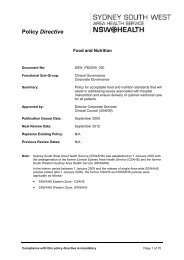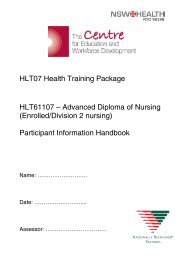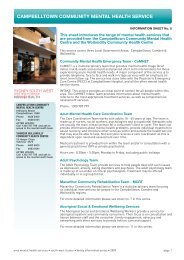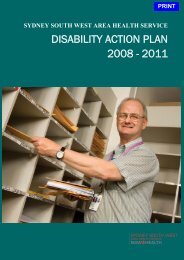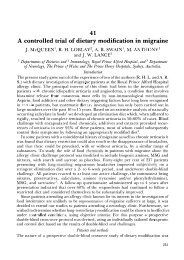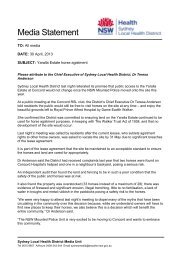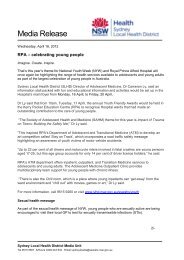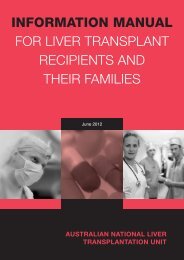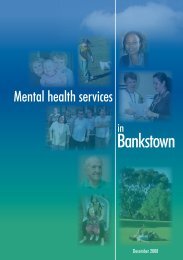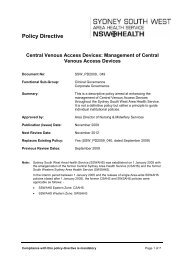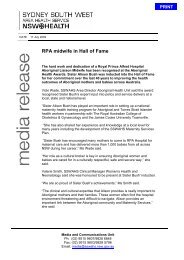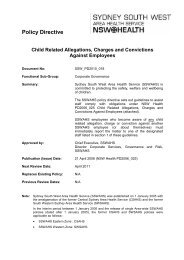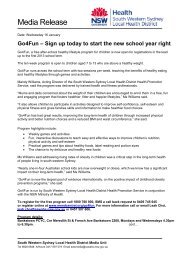Heparin and Warfarin - Sydney South West Area Health Service
Heparin and Warfarin - Sydney South West Area Health Service
Heparin and Warfarin - Sydney South West Area Health Service
You also want an ePaper? Increase the reach of your titles
YUMPU automatically turns print PDFs into web optimized ePapers that Google loves.
<strong>Sydney</strong> <strong>South</strong> <strong>West</strong> <strong>Area</strong> <strong>Health</strong> <strong>Service</strong><br />
Guideline No: SSW_GL2007_010<br />
Date issued: November 2007<br />
Haematology consultation is recommended if by day 7 an adequate INR<br />
is not achieved.<br />
References:<br />
1. Harrison, L; Johnston, M; Massicotte, M; Crowther, M; Moffat, K;<br />
Hirsh, J. Comparison of 5-mg <strong>and</strong> 10-mg Loading Doses in Initiation<br />
of <strong>Warfarin</strong> Therapy. Ann Intern Med 1997; 126(2):133-136.<br />
2. Crowther, M; Harrison, L; Hirsh, J . <strong>Warfarin</strong>: Less May Be Better<br />
[Letter]. Ann Intern Med 1997; 127 (4) :333<br />
3. Harper P, Monahan K, Baker B. <strong>Warfarin</strong> induction at 5 mg daily is<br />
safe with a low risk of anticoagulant overdose: results of an audit of<br />
patients with deep vein thrombosis commencing warfarin. Intern<br />
Med J 2005; 35: 717–720.<br />
5. Range of International Normalised Ratio (INR) Recommended for Specific<br />
Applications for <strong>Warfarin</strong> Therapy *<br />
Condition<br />
INR Range<br />
Preventing DVT (High risk patients eg post hip<br />
2.0 - 3.0<br />
replacement)<br />
Therapy after DVT or Pulmonary Embolism 2.0 - 3.0<br />
Preventing Systemic Embolism<br />
Atrial Fibrillation 2.0 - 3.0<br />
Valvular Heart Disease 2.0 - 3.0<br />
After Myocardial Infarction 2.0 - 3.0<br />
Tissue Heart Valves (first 3 months) 2.0 - 3.0<br />
Mechanical Heart Valve (normal risk) 2.5 - 3.5<br />
Mechanical Heart Valve (high risk) 3.0 - 4.5<br />
DVT = Deep Vein Thrombosis<br />
*Based on the 7 th American College of Chest Physicians Consensus Conference<br />
(Chest 2004; 126: 401S-428S)<br />
Reference: Gallus A et al. Med J Aust 2000; 172:600-605<br />
6. Duration of Anticoagulation:<br />
This is controversial <strong>and</strong> the Attending Medical Officer or Haematologist should<br />
make this decision. The intended duration of <strong>Warfarin</strong> therapy should be clearly<br />
documented <strong>and</strong> communicated to the patient at the time of discharge from<br />
hospital, <strong>and</strong> reviewed prior to cessation.<br />
Compliance with this guideline is recommended Page 13 of 24




